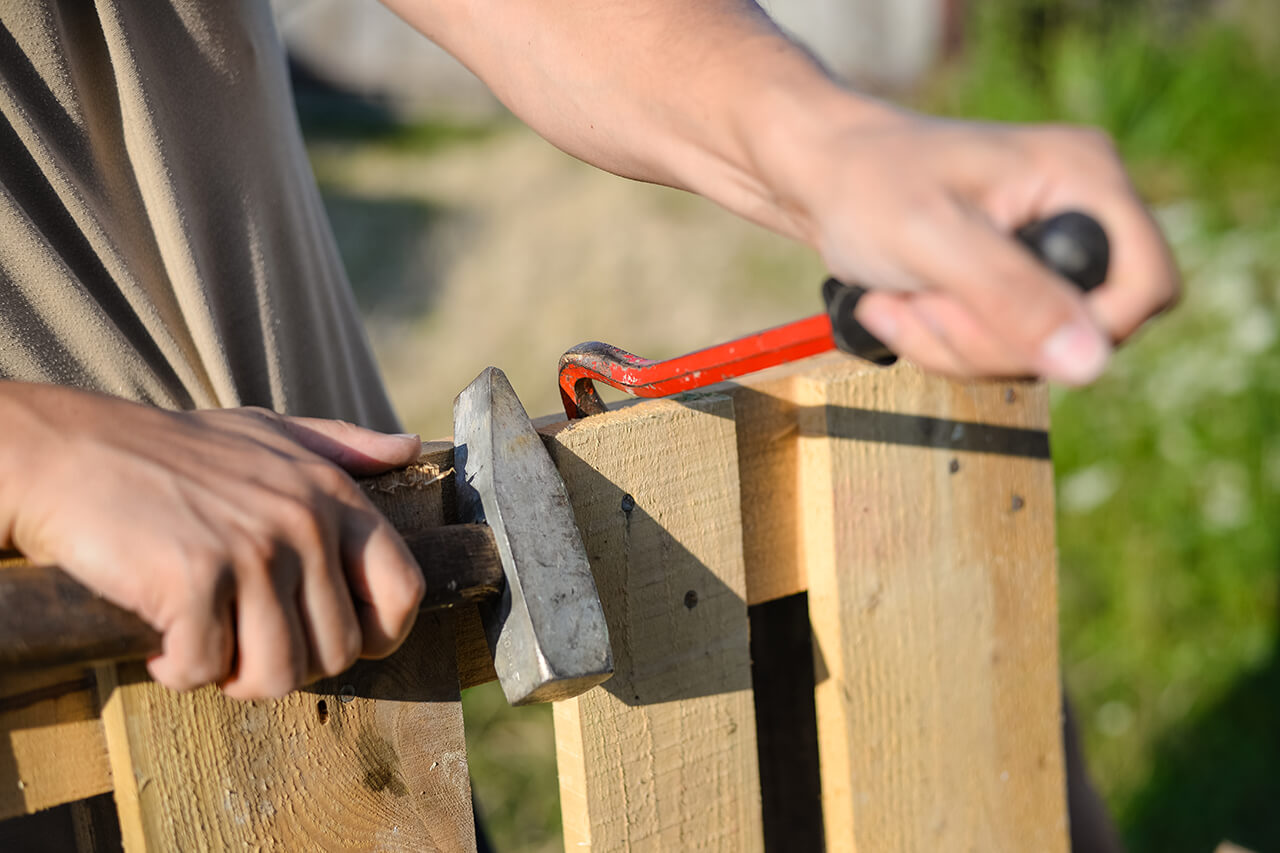How Much Does It Cost to Repair a Wood Fence in 2025?
The average cost to repair a wood fence is $610


Repairing a wood fence keeps your property secure and visually appealing.
Most homeowners pay an average of $610, with costs ranging from $304 to $938.
Factors such as fence size, local labor rates, and material quality all affect repair costs.
Regular maintenance prevents more severe damage and extends the fence's lifespan.
Professional repairs ensure high-quality work, saving time and money in the long term.
This article was updated using automation technology and thoroughly reviewed for accuracy by HomeAdvisor Editor Ryan Noonan.
Most homeowners spend an average of $610 on wood-fence repairs, with the majority of projects falling within the range of $304 to $938. Costs vary depending on your location, fence size, and the frequency of board maintenance, so it pays to plan and hire a professional when needed. For instance, smaller projects can cost as little as $50, while larger, more complex repairs can reach $5,450. Tackling repairs promptly helps maintain high curb appeal and prevents costly fixes later.
Common Fence Issues and the Cost to Repair Them
Start by pinpointing the problem. Many common issues—from loose rails to below-ground rot—are relatively quick fixes once you know what you’re dealing with.
Rail Damage Repair and Wood Posts Replacement Costs
If a post is beyond repair, replacing it costs $270 on average. Shifting ground can cause posts to move out of position, but there are less expensive repairs, like resetting a post.
Weather deterioration, rot, or collision with an automobile will necessitate replacement, which will incur significantly higher costs. In some cases, you can use a steel spike, mender, or bracket to reinforce a damaged post or rail instead of replacing it, which can cost $12 to $20, excluding labor.
Repair needs vary by wood type and fence design, but skip the DIY route—rails reinforce the posts, and an incorrect fix can cause more damage down the line. In most cases, a professional can repair or replace the damage and leave the rest of the fence intact, saving the homeowner time and money.
Cost to Repair a Rotted Wood Post
Repairing rot costs between $150 and $500, depending on the extent of the damage. This may include chemical treatments, filling holes, and staining or painting the surface. In severe cases, you may need to replace the entire fence.
Because wood lives outdoors, it’s prone to rot. A pro can patch a post, reinforce it, or swap it out entirely. Full replacement costs more but often delivers a longer-lasting fix against weather and insects.
Cost to Repair Holes & Cracks in a Wood Fence
Patching holes or cracks costs $125 to $400 to climb, depending on whether the boards need sanding and a fresh coat of stain or paint afterward.
Causes of holes and cracks can include:
Termites
Climate conditions
Damage from a collision
Termites and climate conditions can cause wood fences to develop holes and cracks over time. Structures do not always need replacement, though. If the hole or crack isn't too extensive, you can patch or refinish boards, panels, and slats instead.
When extreme damage compromises the fence's integrity, you will need to remove the piece and replace it. That's why homeowners should have extra pieces of the same kind of lumber on hand. You can use them for patchwork at any time and avoid having a mismatched piece.
Weather Damage
Weather-related fixes cost $210 to $620, depending on the finish and the extent of wear the fence has endured. Preparation of the surface, including cleaning and removing old finishes, may require additional time, materials, and equipment, and could increase the total project costs.
To maximize durability, homeowners should stain or paint the wood to protect it from the weather for as long as possible. The type of stain or paint you add will affect how long it lasts against elements other than wind or termite damage.
Leaning, Sagging, or Shifting Ground
You’ll pay between $200 and $400 to straighten a fence that’s leaning because of damage or shifting soil. If the foundation and posts are sound, repairing rails and panels may be enough. Major work on the foundation and support structure will be more expensive.
Causes of a leaning or sagging fence can include:
Base rot
Failing parts
Soil shifting
Weather conditions
Posts sometimes sag because their bases rot below the ground level, but that doesn't mean you have to replace them. Instead, you can dig out the ground around it, put it in the correct upright position, and pour concrete around the base to hold it correctly in place again. Basic concrete costs between $3 to $6 per square foot. Another way to correct the sag is to install a diagonal brace to prop it up, again using concrete for support.
Sagging gates can occur due to surrounding posts sinking into the ground or failing components. A gate can also sag if its heaviness forces the frame out of alignment. To fix this, you can install a tension rod with a turnbuckle adjustment for $5 to $15, excluding labor. Another way to mend a misaligned gate is to remove it from the hinges and attach a new wood diagonal bracing kit, which costs between $15 and $40, not including labor.
In most cases, sagging or leaning is a complicated repair and not a DIY project. Homeowners should call a professional to diagnose the problem and obtain a quote for the repair.
Wooden Gate Repair Costs
Gate repairs range from $100 to $400, covering everything from a quick hinge replacement to structural fixes. Material matters—wood and vinyl gates tend to be less expensive to repair than metal options.
Problems with gates can include:
Loose or creaky hinges
Sagging due to weight
Misaligned latches
Wood Fence Picket Replacement
Replacing missing boards or panels costs between $150 and $300. Prices depend on the type of wood you choose and the size of the replacement pieces.
Pickets cost $1 to $10 each, depending on the wood and style. Swap them out as soon as they warp or split, then stain or paint the new boards so they blend in and last longer.
Factors that Affect Repair Costs
Several factors affect repair costs, including local codes, the extent of the damage, the size of the fence, the type of fence, and its style. Your location, the age of the fence, and its condition also influence the price.
Permits and Codes
For repairs, it's your responsibility to ensure the project complies with state, local, and community guidelines. Permits aren't always required for repairs, but when they are, your pro will often handle them and include the cost in the quote. Be sure to seek approval from your homeowners association before starting work to avoid fines or conflicts.
Height
Height will be different depending on local city codes and homeowner expectations. On average, local front yard codes for residential areas limit fences to a height of between 3 and 4 feet. Back or side yard structures can be around 6 feet tall. Those who need to make repairs will need to consider costs based on those heights.
Extent of Damage
The amount of damage will affect how much you pay. In most cases, the extent of damage depends on the type of wood. For example, pressure-treated lumber has many preservatives, so it will last indefinitely. Compared to other types, cedar and redwood hold up well underground and require minimal stain or paint to withstand the elements.
Those who invest in these types of materials are less likely to experience extensive harm. If they invest in less expensive materials, they may have a greater quantity, which could result in more extensive repairs and a higher overall price.
Supporting Structure
Since posts support the rails and panels of the fence, they will be the main area needing repair should they ever break or rot. If an undamaged post moves out of its regular position, it will need to be reset in a concrete foundation or at a deeper level in the ground.
You will need to patch, refinish, or replace worn posts, depending on the extent of wear and tear and its impact on the rest of the structure. The type of damage, labor, number of posts, and type of wood will factor into the total cost to repair this supporting structure.
Fence Maintenance Costs
Regular cleaning and maintenance can extend the life of your fence and keep it looking its best. You can maintain your fence with a bit of time and a few inexpensive tools.
Equipment
The cost of pressure washing varies based on the length of your fence and other local specifics. You can purchase an electric or gas-powered pressure washer for between $90 and $800, depending on the desired power. You can also rent pressure washers for between $40 and $100 per day. Be sure to select the appropriate equipment, sprayer tip, and technique when cleaning and preparing the material. Too much pressure can cause damage, while too little pressure will not effectively prepare the surface.
Staining, Painting, and Sealing
Painting or staining a fence costs between $3 and $14 per linear foot. Coating your fence will enhance its overall appearance and improve its durability. Reapply sealants according to the manufacturer's recommendations, every six to 24 months. Homeowners may also want to keep leftover or matching stain, paint, and sealant on hand for repairs and quick fixes.
DIY Wood Fence Repair vs. Hiring a Pro
Hiring a local fence contractor is often the faster and safer choice. Fence repairs usually require two sets of hands, specialty tools, and experience that you may not have. A pro can save time and money by buying materials at wholesale rates, finishing the job quickly, and sidestepping costly mistakes. Search for fencing pros near you and collect at least two quotes before you choose. Consider hiring a professional fencing contractor to ensure your wood fence is repaired correctly and efficiently.
How HomeAdvisor Gets Its Cost Data
No place is more important than your home, which is why HomeAdvisor connects homeowners with local pros to transform their houses into homes they love. To help homeowners prepare for their next project, HomeAdvisor provides readers with accurate cost data and follows strict editorial guidelines. We surveyed over 10,000 real customers about their project costs to develop the pricing data you see, so you can make the best decisions for you and your home. We pair this data with research from reputable sources, including the U.S. Bureau of Labor Statistics, academic journals, market studies, and interviews with industry experts—all to ensure our prices reflect real-world projects.



- Aluminum or Steel Fence - Repair
- Barbed Wire Fence - Install
- Vinyl or PVC Fence - Install
- Aluminum or Steel Fence - Install
- Electronic Pet Fence - Install
- Wrought Iron Fence - Install
- Wood Fence - Install
- Vinyl or PVC Fence - Repair
- Wrought Iron Fence - Repair or Weld
- Gate for Driveway or Security - Install or Replace
- Chain Link Fence - Install
- Chain Link Fence - Repair or Alter





